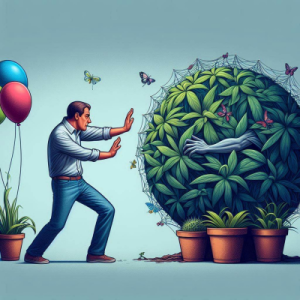As you age, did you know that approximately 1 in 8 people develop new phobias later in life? Certain fears may start to surface as you navigate the complexities of aging and changing circumstances.
From a fear of technology to concerns about health and social interactions, these phobias can have a significant impact on your daily life. Stay tuned to explore the five phobias that might unexpectedly manifest as you journey through the later stages of life, and discover strategies to address and overcome these common fears.
Fear of Technology
 As you age, you may find yourself developing a fear of technology, a common phobia that can arise due to feelings of overwhelm or difficulty adapting to rapid advancements.
As you age, you may find yourself developing a fear of technology, a common phobia that can arise due to feelings of overwhelm or difficulty adapting to rapid advancements.
Cybersecurity concerns and digital overload contribute to this fear, as the increasing reliance on technology exposes individuals to potential data breaches and information theft. The constant evolution of technological advancements can also be intimidating, making it challenging to keep up with the latest trends and functionalities.
Moreover, virtual reality anxieties can further exacerbate this fear. The immersive nature of virtual reality experiences can blur the lines between what’s real and what’s not, triggering discomfort and unease in individuals who struggle with technology-related fears.
Exploring virtual environments and engaging with simulated scenarios may heighten feelings of vulnerability and insecurity, reinforcing the fear of technology.
Understanding these underlying concerns and seeking support to address them can help individuals overcome their fear of technology and embrace the opportunities that digital innovation has to offer.
Height Phobia
Developing a fear of heights later in life can be a distressing experience for many individuals. Suddenly feeling extreme fear when looking down from a high place can trigger panic attacks, making everyday activities like climbing stairs or standing on a balcony overwhelming. This phobia, known as acrophobia, can notably impact your quality of life. Here are some ways this fear might manifest:
-
Heart Racing: When faced with heights, your heart may start racing uncontrollably, making you feel like it’s about to leap out of your chest.
-
Sweaty Palms: Your palms might become clammy and sweaty, causing your grip to weaken, making it challenging to hold onto railings or ledges.
-
Dizziness: The feeling of dizziness can be intense, making you lose your balance and feel disoriented, heightening the fear of falling.
Experiencing these symptoms can be frightening, but with proper support and guidance, it’s possible to manage and overcome a height phobia.
Social Anxiety
Experiencing social anxiety can greatly impact your ability to engage in social interactions and navigate various social settings comfortably. Public speaking, crowded spaces, meeting new people, and social gatherings can all trigger feelings of anxiety and discomfort in individuals with social anxiety.
In situations like public speaking, individuals may feel intense fear of being judged or scrutinized by others, leading to physical symptoms like sweating, trembling, or a racing heart. Crowded spaces can be overwhelming, causing individuals to feel a sense of panic or a need to escape. Meeting new people and attending social gatherings may induce worry about saying the wrong things or not fitting in, making social interactions challenging.
It’s important to recognize the impact of social anxiety on individuals and provide support and understanding to help them navigate these situations. Strategies such as deep breathing exercises, cognitive-behavioral therapy, and gradual exposure to social settings can assist individuals in managing their social anxiety and improving their overall quality of life.
Health-related Phobias
Health-related phobias can manifest as intense fears or anxieties surrounding specific aspects of medical care or bodily sensations. These phobias can greatly impact an individual’s quality of life and may require professional intervention to manage effectively.
Two common health-related phobias are needle phobia, which is a fear of injections often associated with dental procedures, and blood phobia, which is a fear of medical tests that involve drawing blood.
-
Dental procedures, needle phobia: Imagine the sharp, gleaming needle approaching your skin, triggering a wave of panic and dread. The sound of the drilling machine intensifies your anxiety, making each dental visit a challenging ordeal.
-
Medical tests, blood phobia: Picture the sterile environment of a medical lab, the sight of vials filling up with your blood sending shivers down your spine. The mere thought of undergoing tests that involve blood draws can induce a state of paralyzing fear, leading to avoidance of essential medical examinations.
-
Emergency situations, health-related panic: Consider the scenario where a sudden health issue arises, and the fear of medical interventions or hospital settings overwhelms you, hindering prompt access to necessary care.
Fear of Aging
As individuals get older, it isn’t uncommon to experience a fear of aging, characterized by apprehensions about physical decline, cognitive abilities, and societal perceptions. One common aspect of this fear is the dread of wrinkles, a visible reminder of the passage of time. The societal emphasis on youth and beauty can exacerbate this fear, leading to anxiety and self-esteem issues as one notices the signs of aging on their skin.
Another significant concern that contributes to the fear of aging is the fear of retirement. The prospect of leaving a long-time career, losing a sense of purpose, or facing financial uncertainties can be overwhelming. Retirement symbolizes a major life change that can trigger feelings of insecurity and fear of the unknown. It requires adjusting to a new routine, finding alternative ways to stay engaged, and coping with the changes in social interactions.
Navigating the fear of aging involves acknowledging these concerns, seeking support from loved ones or professionals, and embracing the wisdom and experiences that come with growing older.
Conclusion
To sum up, it’s common for individuals to develop phobias later in life that can impact their daily lives.
According to a study by the American Psychological Association, approximately 12% of older adults experience some form of phobia.
By seeking support, practicing coping strategies, and embracing personal growth, individuals can effectively manage and overcome these fears to maintain a fulfilling and enriched quality of life.





